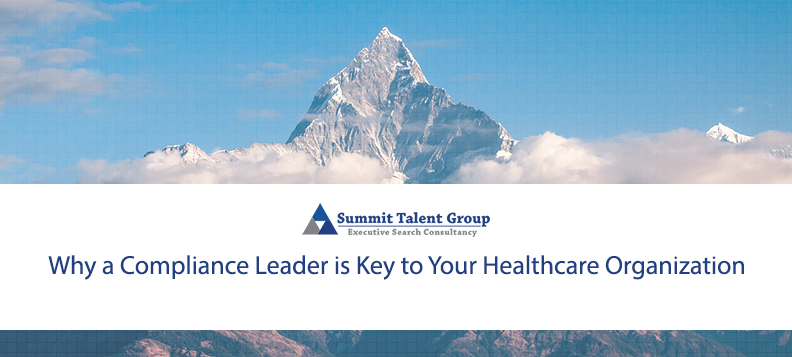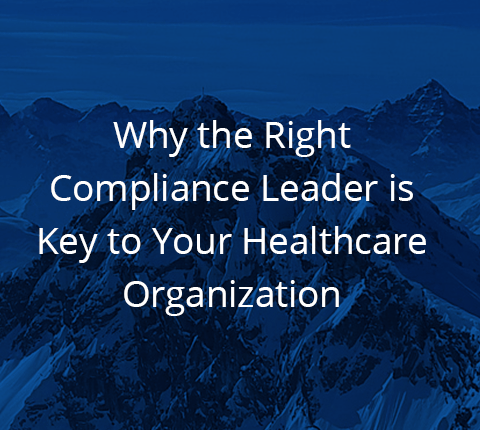Why the Right Compliance Leader is Key to Your Healthcare Organization
Healthcare compliance becomes more and more important on a daily basis. Failing to observe medical regulations, guidelines, and laws is not an option for those of us who are involved in healthcare. When healthcare organizations become non-compliant they run legal, financial and ethical risks. As such, having the right compliance leader in place, one how can ascertain that all rules and regulations are being met in order to mitigate financial, regulatory, and reputational risk is integral to your healthcare organization.
Why a Compliance Leader is Key to Your Healthcare Organization

Compliance Leadership Responsibilities
Healthcare compliance is complicated and touches every department in a hospital or healthcare system. Some items that your compliance leader will be responsible for are:
– False Claims Act – Medicare and Medicaid Reimbursement regulations
– Emergency Medical Treatment and Active Labor Act (EMTALA)
– Meaningful Use Guidelines
– Joint Commission on Accreditation of Healthcare Organizations (JCAHO) standards
– “HITECH
– Stark Law
– Anti-kickback Statutes
– HIPAA Privacy and Security rules
– Occupational Safety and Health Administration (OSHA) guidelines
As such, your compliance leader must be able to reduce the chance of risks, prevent penalties, and make sure that the organization is following all rules and regulations.
What Does a Compliance Leader Do?
In order to make sure that the healthcare organization is running according to the law, the compliance officer must take several actions.
First, they must conduct an internal audit and review existing monitoring systems and departments. Then, they must look at all current laws and regulations to come up with practice standards to keep the organization compliant. Once this set of practice standards have been set, they must be clearly communicated to the team and compliance training and education must be put into place.
Once the above has been executed, there must be a crisis plan in place to deal with those times when the organization may become non-compliant. This plan must include ways to detect compliance issues, a set of responses once non-compliance is detected (both within the organization as well as externally), and corrective actions to be taken when needed.
Beyond the Basics
A strong compliance leader goes beyond the steps mentioned above. They must have open lines of communication with multiple departments including billing and coding. Clear communication will make it easier for your compliance leader to monitor, audit, and oversee the compliance program.They must also have strong reporting skills to be able to communicate their findings to the governing body, physicians, and partners. They must also work alongside HR to avoid bringing on individuals who have been or may be sanctioned in the future.
Skills an Effective Compliance Leader Must Possess
An effective compliance leader must be a great educator. He or she must be able to develop and instruct the entire staff. This does not mean that he or she will individually train the entire organization in compliance. This type of leader must understand the best ways to scale up education programs in order to be sure that everyone has received the learning necessary to keep the organization compliant. This includes working with Human Resources to make sure that the right introductory training is in place for new employees and that continuing education is in place for current employees and managers.
This type of leader must be highly analytical in order to diagnose where potential compliance risks lie and work to avoid these issues from happening in the future.
He or she must be prepared to handle reported violations from start to finish and develop the consistent and fair procedures for those times when violations are reported. He or she must also be able to serve as an internal overseer to make certain that compliance issues are properly being managed.
Collaboration skills are a must. A compliance leader must be able to effectively work with other departments. It is not enough to know what can make the organization non-compliant. This leader must understand how the various departments work, what their pain points are, and then work with leadership within those departments to come up with solutions that alleviate those pain points while adhering to regulations, processes, and laws.
In order to be successful, a strong compliance manager must be able to analyze and interpret data. It takes more than basic practices to put together a proper compliance program. One must monitor stats, analyze them, and figure out how they fit into and what they mean to the healthcare organization. It is through data that a compliance manager can scale up the compliance process to identify weaknesses and then create reports that communicate what is happening or could happen in the organization to the board and other leadership.
Along with the above, this leader must have an in-depth understanding of new and ever-changing technology that allows for compliance to become a more effective process. When your compliance leader is informed and grasps technology tools, he or she can put the most effective ones into place to make compliance a much simpler goal to achieve.
How to Find The Right Compliance Leader
If your health system or healthcare organization is currently in need of a compliance leader, contact us. As a boutique healthcare executive search firm, you will find that we work differently than most. Our leadership team is made up of healthcare industry professionals. Because we have worked in healthcare, we understand the challenges of healthcare organizations as well as the traits and skills that a leader must have in order to keep your organization compliant.
When you work with the Summit Talent Group team, you know that the search process is not being diluted to less experienced team members or to industry neophytes. We are with you every step of the process and truly get the time to understand your particular needs and challenges so that we can place the right person. This means going beyond certifications. We make sure that the candidates who are presented to you will be fully committed to your mission and will have longevity in your organization.
If you’d like to talk with us and learn more about how we work, contact us. We look forward to speaking with you.

Business Manager, Summit Talent Group

